The Ven John Woolhouse , Archdeacon of Tuam [1] died during 1662. [2]
The Ven John Woolhouse , Archdeacon of Tuam [1] died during 1662. [2]
Gospel originally meant the Christian message, but in the 2nd century it came to be used also for the books in which the message was reported. In this sense a gospel can be defined as a loose-knit, episodic narrative of the words and deeds of Jesus, culminating in his trial and death and concluding with various reports of his post-resurrection appearances. Modern biblical scholars are cautious of relying on the gospels uncritically, but nevertheless, they provide a good idea of the public career of Jesus, and critical study can attempt to distinguish the original ideas of Jesus from those of the later Christian authors.
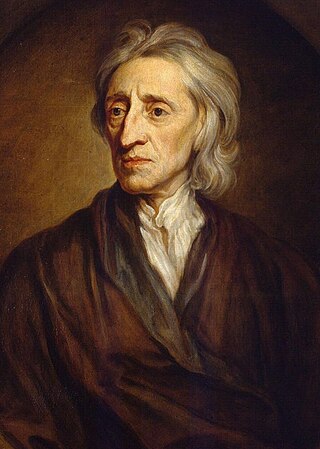
John Locke was an English philosopher and physician, widely regarded as one of the most influential of Enlightenment thinkers and commonly known as the "father of liberalism". Considered one of the first of the British empiricists, following the tradition of Francis Bacon, Locke is equally important to social contract theory. His work greatly affected the development of epistemology and political philosophy. His writings influenced Voltaire and Jean-Jacques Rousseau, and many Scottish Enlightenment thinkers, as well as the American Revolutionaries. His contributions to classical republicanism and liberal theory are reflected in the United States Declaration of Independence. Internationally, Locke's political-legal principles continue to have a profound influence on the theory and practice of limited representative government and the protection of basic rights and freedoms under the rule of law.
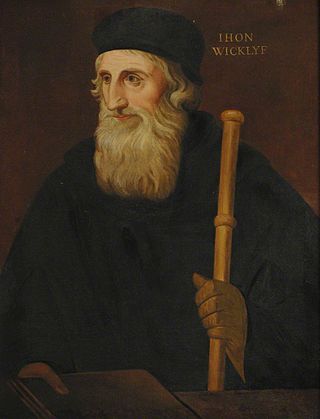
John Wycliffe was an English scholastic philosopher, theologian, biblical translator, reformer, Catholic priest, and a seminary professor at the University of Oxford. He became an influential dissident within the Catholic priesthood during the 14th century and is considered an important predecessor to Protestantism. Wycliffe questioned the privileged status of the clergy, who had bolstered their powerful role in England, and advocated radical poverty of the clergy.

John the Evangelist is the name traditionally given to the author of the Gospel of John. Christians have traditionally identified him with John the Apostle, John of Patmos, and John the Presbyter, although this has been disputed by most modern scholars.
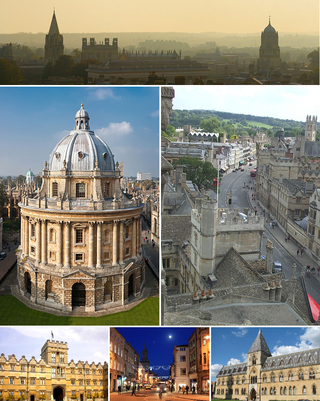
Oxford is the only city in Oxfordshire, England, of which it is the county town. It had a population of 162,100 at the 2021 census. It is 56 miles (90 km) north-west of London, 64 miles (103 km) south-east of Birmingham and 61 miles (98 km) north-east of Bristol. The city is home to the University of Oxford, the oldest university in the English-speaking world; it has buildings in every style of English architecture since late Anglo-Saxon. Oxford's industries include motor manufacturing, education, publishing, information technology and science.

The Oxford English Dictionary (OED) is the principal historical dictionary of the English language, published by Oxford University Press (OUP). It traces the historical development of the English language, providing a comprehensive resource to scholars and academic researchers, as well as describing usage in its many variations throughout the world.
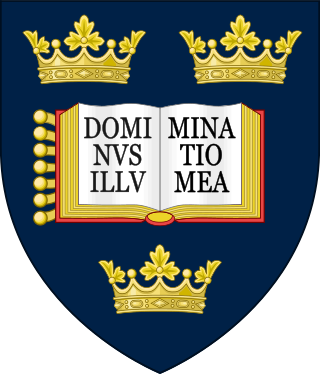
The University of Oxford is a collegiate research university in Oxford, England. There is evidence of teaching as early as 1096, making it the oldest university in the English-speaking world and the world's second-oldest university in continuous operation. It grew rapidly from 1167, when Henry II banned English students from attending the University of Paris. After disputes between students and Oxford townsfolk in 1209, some academics fled north-east to Cambridge where they established what became the University of Cambridge. The two English ancient universities share many common features and are jointly referred to as Oxbridge.

William Shakespeare was an English playwright, poet and actor. He is widely regarded as the greatest writer in the English language and the world's pre-eminent dramatist. He is often called England's national poet and the "Bard of Avon". His extant works, including collaborations, consist of some 39 plays, 154 sonnets, three long narrative poems, and a few other verses, some of uncertain authorship. His plays have been translated into every major living language and are performed more often than those of any other playwright. Shakespeare remains arguably the most influential writer in the English language, and his works continue to be studied and reinterpreted.

John the Apostle or Saint John the Beloved was one of the Twelve Apostles of Jesus according to the New Testament. Generally listed as the youngest apostle, he was the son of Zebedee and Salome. His brother James was another of the Twelve Apostles. The Church Fathers identify him as John the Evangelist, John of Patmos, John the Elder, and the Beloved Disciple, and testify that he outlived the remaining apostles and was the only one to die of natural causes, although modern scholars are divided on the veracity of these claims.

John Henry Newman was an English theologian, academic, philosopher, historian, writer, and poet, first as an Anglican priest and later as a Catholic priest and cardinal, who was an important and controversial figure in the religious history of England in the 19th century. He was known nationally by the mid-1830s, and was canonised as a saint in the Catholic Church in 2019.

Pussy is a term used as a noun, an adjective, and—in rare instances—a verb in the English language. It has several meanings, as slang, as euphemism, and as vulgarity. Most commonly, it is used as a noun with the meaning "cat", "coward", or "weakling". In slang usage, it can mean "vulva or vagina" and less commonly, as a form of synecdoche, meaning "sexual intercourse with a woman". Because of its multiple senses including both innocent and vulgar connotations, pussy is often the subject of double entendre.
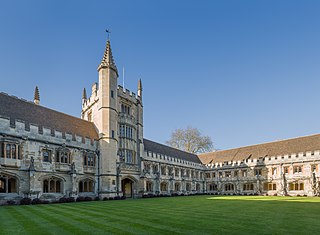
Magdalen College is a constituent college of the University of Oxford. It was founded in 1458 by Bishop of Winchester William of Waynflete. It has the highest total assets of any Oxford college, with £977 million as of 2022, and is one of the strongest academically, setting the record for the highest Norrington Score in 2010 and topping the table twice since then. It is home to several of the university's distinguished chairs, including the Agnelli-Serena Professorship, the Sherardian Professorship, and the four Waynflete Professorships.
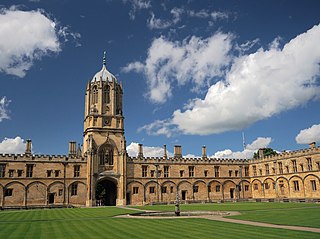
Christ Church is a constituent college of the University of Oxford in England. Founded in 1546 by King Henry VIII, the college is uniquely a joint foundation of the university and the cathedral of the Oxford diocese, Christ Church Cathedral, which also serves as the college chapel and whose dean is ex officio the college head.
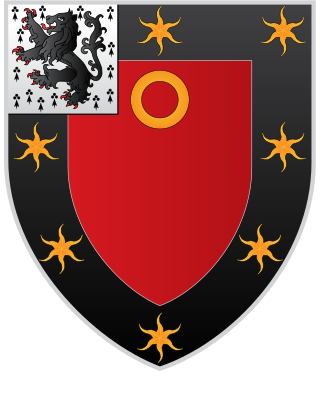
St John's College is a constituent college of the University of Oxford. Founded as a men's college in 1555, it has been coeducational since 1979. Its founder, Sir Thomas White, intended to provide a source of educated Roman Catholic clerics to support the Counter-Reformation under Queen Mary.

The Oxford Movement was a movement of high church members of the Church of England which began in the 1830s and eventually developed into Anglo-Catholicism. The movement, whose original devotees were mostly associated with the University of Oxford, argued for the reinstatement of some older Christian traditions of faith and their inclusion into Anglican liturgy and theology. They thought of Anglicanism as one of three branches of the "one, holy, catholic, and apostolic" Christian church. Many key participants subsequently converted to Roman Catholicism.

Jesus, also referred to as Jesus Christ, Jesus of Nazareth, and many other names and titles, was a first-century Jewish preacher and religious leader. He is the central figure of Christianity, the world's largest religion. Most Christians believe Jesus to be the incarnation of God the Son and the awaited messiah, the Christ that is prophesied in the Hebrew Bible.

The House of Plantagenet was a royal house which originated in Anjou. The name Plantagenet is used by modern historians to identify four distinct royal houses; the Angevins, who were also Counts of Anjou; the main line of the Plantagenets following the loss of Anjou; and the houses of Lancaster and York, the Plantagenets' two cadet branches. The family held the English throne from 1154, with the accession of Henry II, until 1485, when Richard III died.

Islam is an Abrahamic monotheistic religion centered on the Quran and the teachings of Muhammad, the religion's founder. Adherents of Islam, called Muslims, are estimated to number approximately 1.9 billion worldwide and are the world's second-largest religious population after Christians. Largely due to having a high proportion of young people, and a high fertility rate, Muslims are the world's fastest-growing major religious group.